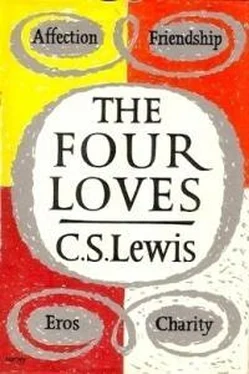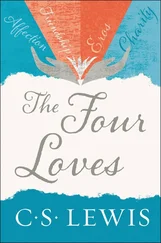The real spiritual danger in Eros as a whole lies, I believe, elsewhere. I will return to the point. For the moment, I want to speak of the danger which at present, in my opinion, especially haunts the act of love. This is a subject on which I disagree, not with the human race (far from it), but with many of its gravest spokesmen. I believe we are all being encouraged to take Venus too seriously; at any rate, with a wrong kind of seriousness. All my life a ludicrous and portentous solemnisation of sex has been going on.
One author tells us that Venus should recur through the married life in "a solemn, sacramental rhythm". A young man to whom I had described as "pornographic" a novel that he much admired, replied with genuine bewilderment, "Pornographic? But how can it be? It treats the whole thing so seriously"—as if a long face were a sort of moral disinfectant. Our friends who harbour Dark Gods, the "pillar of blood" school, attempt seriously to restore something like the Phallic religion. Our advertisements, at their sexiest, paint the whole business in terms of the rapt, the intense, the swoony–devout; seldom a hint of gaiety. And the psychologists have so bedevilled us with the infinite importance of complete sexual adjustment and the all but impossibility of achieving it, that I could believe some young couples now go to it with the complete works of Freud, Kraft–Ebbing, Havelock Ellis and Dr. Stopes spread out on bed–tables all round them. Cheery old Ovid, who never either ignored a mole–hill or made a mountain of it, would be more to the point. We have reached the stage at which nothing is more needed than a roar of old–fashioned laughter.
But, it will be replied, the thing is serious. Yes; quadruply so. First, theologically, because this is the body's share in marriage which, by God's choice, is the mystical image of the union between God and Man. Secondly, as what I will venture to call a sub–Christian, or Pagan or natural sacrament, our human participation in, and exposition of, the natural forces of life and fertility—the marriage of Sky–Father and Earth–Mother. Thirdly, on the moral level, in view of the obligations involved and the incalculable momentousness of being a parent and ancestor. Finally it has (sometimes, not always) a great emotional seriousness in the minds of the participants.
But eating is also serious; theologically, as the vehicle of the Blessed Sacrament; ethically in view of our duty to feed the hungry; socially, because the table is from time immemorial the place for talk; medically, as all dyspeptics know. Yet we do not bring bluebooks to dinner nor behave there as if we were in church. And it is gourmets , not saints, who come nearest to doing so. Animals are always serious about food.
We must not be totally serious about Venus. Indeed we can't be totally serious without doing violence to our humanity. It is not for nothing that every language and literature in the world is full of jokes about sex. Many of them may be dull or disgusting and nearly all of them are old. But we must insist that they embody an attitude to Venus which in the long run endangers the Christian life far less than a reverential gravity. We must not attempt to find an absolute in the flesh. Banish play and laughter from the bed of love and you may let in a false goddess. She will be even falser than the Aphrodite of the Greeks; for they, even while they worshipped her, knew that she was "laughter–loving". The mass of the people are perfectly right in their conviction that Venus is a partly comic spirit. We are under no obligation at all to sing all our love–duets in the throbbing, world–without–end, heart–breaking manner of Tristan and Isolde; let us often sing like Papageno and Papagena instead.
Venus herself will have a terrible revenge if we take her (occasional) seriousness at its face value. And that in two ways. One is most comically—though with no comic intention—illustrated by Sir Thomas Browne when he says that her service is "the foolishest act a wise man commits in all his life, nor is there anything that will more deject his cool'd imagination, when he shall consider what an odd and unworthy piece of folly he had committed". But if he had gone about that act with less solemnity in the first place he would not have suffered this "dejection". If his imagination had not been misled, its cooling would have brought no such revulsion. But Venus has another and worse revenge.
She herself is a mocking, mischievous spirit, far more elf than deity, and makes game of us. When all external circumstances are fittest for her service she will leave one or both the lovers totally indisposed for it. When every overt act is impossible and even glances cannot be exchanged—in trains, in shops, and at interminable parties—she will assail them with all her force. An hour later, when time and place agree, she will have mysteriously withdrawn; perhaps from only one of them. What a pother this must raise—what resentments, self–pities, suspicions, wounded vanities and all the current chatter about "frustration"—in those who have deified her! But sensible lovers laugh. It is all part of the game; a game of catch–as–catch–can, and the escapes and tumbles and head–on collisions are to be treated as a romp.
For I can hardly help regarding it as one of God's jokes that a passion so soaring, so apparently transcendent, as Eros, should thus be linked in incongruous symbiosis with a bodily appetite which, like any other appetite, tactlessly reveals its connections with such mundane factors as weather, health, diet, circulation, and digestion. In Eros at times we seem to be flying; Venus gives us the sudden twitch that reminds us we are really captive balloons. It is a continual demonstration of the truth that we are composite creatures, rational animals, akin on one side to the angels, on the other to tom–cats. It is a bad thing not to be able to take a joke. Worse, not to take a divine joke; made, I grant you, at our expense, but also (who doubts it?) for our endless benefit.
Man has held three views of his body. First there is that of those ascetic Pagans who called it the prison or the "tomb" of the soul, and of Christians like Fisher to whom it was a "sack of dung", food for worms, filthy, shameful, a source of nothing but temptation to bad men and humiliation to good ones. Then there are the Neo–Pagans (they seldom know Greek), the nudists and the sufferers from Dark Gods, to whom the body is glorious. But thirdly we have the view which St. Francis expressed by calling his body "Brother Ass". All three may be—I am not sure—defensible; but give me St. Francis for my money.
Ass is exquisitely right because no one in his senses can either revere or hate a donkey. It is a useful, sturdy, lazy, obstinate, patient, lovable and infuriating beast; deserving now the stick and now a carrot; both pathetically and absurdly beautiful. So the body. There's no living with it till we recognise that one of its functions in our lives is to play the part of buffoon. Until some theory has sophisticated them, every man, woman and child in the world knows this. The fact that we have bodies is the oldest joke there is. Eros (like death, figure–drawing, and the study of medicine) may at moments cause us to take it with total seriousness. The error consists in concluding that Eros should always do so and permanently abolish the joke. But this is not what happens. The very faces of all the happy lovers we know make it clear. Lovers, unless their love is very short–lived, again and again feel an element not only of comedy, not only of play, but even of buffoonery, in the body's expression of Eros. And the body would frustrate us if this were not so. It would be too clumsy an instrument to render love's music unless its very clumsiness could be felt as adding to the total experience its own grotesque charm—a sub–plot or antimasque miming with its own hearty rough–and–tumble what the soul enacts in statelier fashion. (Thus in old comedies the lyric loves of the hero and heroine are at once parodied and corroborated by some much more earthy affair between a Touchstone and an Audrey or a valet and a chambermaid). The highest does not stand without the lowest. There is indeed at certain moments a high poetry in the flesh itself; but also, by your leave, an irreducible element of obstinate and ludicrous un–poetry. If it does not make itself felt on one occasion, it will on another. Far better plant it foresquare within the drama of Eros as comic relief than pretend you haven't noticed it.
Читать дальше











